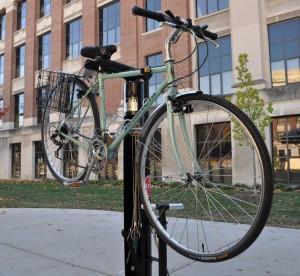 If there’s one thing most bike advocates will agree on, it’s that for a city to be bike friendly, it has to have the infrastructure to support biking. Bike infrastructure—like protected bike lanes, good signage, and bike-only traffic signals—is highly visible. It’s tangible evidence of a bike-friendly community. But wouldn’t it also be nice if a city supported biking by supplying bikers with some of the basic amenities that make biking feasible? What about something as simple as air?
If there’s one thing most bike advocates will agree on, it’s that for a city to be bike friendly, it has to have the infrastructure to support biking. Bike infrastructure—like protected bike lanes, good signage, and bike-only traffic signals—is highly visible. It’s tangible evidence of a bike-friendly community. But wouldn’t it also be nice if a city supported biking by supplying bikers with some of the basic amenities that make biking feasible? What about something as simple as air?
Colleges and universities throughout the country have started to install bike “Fixit” stands. These standalone bicycle maintenance stations, manufactured by Minneapolis-based Dero Co., come complete with tools like pliers, wrenches and screwdrivers, as well as an air pump. The stands contain just about everything a biker needs to perform basic bicycle maintenance, from tightening brakes, to fixing a flat, to the most basic of bike functions—keeping tires full of air. The stands are available at all times, and some Fixit stands even have accompanying bike vending machines that sell tubes, lube and other basic bike supplies.
While colleges and universities have installed the stands en mass—UC Davis has 14 on its campus, Texas A & M 8, University of Oregon 5—most cities have not. Dero has, in fact, shipped over 2000 of the Fixit stands to college and university campuses, but only about 500 to municipalities. Stephanie, from Dero, told me that they intended to first reach out to colleges, noting that the stands do take some maintenance and that there can be fewer bureaucratic hurdles on a college campus as opposed to a city. Plus, many colleges have dedicated “green funds” to support such endeavors.
Cambridge is one of the few cities to have installed the stands. Cara Seiderman, Transportation Program Manager at Cambridge’s Community Development Department, acknowledged that while the stands were not overly expensive and actually easy to install, they do take some maintenance. She assumed this is why cities are wary to install the product. Still, Stephanie, from Dero, hopes that cities will start to install more of the Fixit stands in a move to create a fuller infrastructure that supports biking.
Alison Dewey, from the League of American Bicyclists, weighed in on why cities are lagging behind colleges when it comes to installing bike amenities, suggesting that, “Citizens assume that their city officials understand what they want and need. If no one is making a request for a bike stand, there probably wouldn’t be any installed.” She cites amount of space available, cost, the opinion of nearby businesses and other interest groups as potential barriers to the installation of Fixit stands or bike racks in general.
This doesn’t mean that bike amenities are not possible; it just means that bikers need to start seeing them as a possibility—and adding them to the list of what makes a community bike friendly. Air is a fundamental part of biking. Car drivers know this and, in California, for example, if you buy gas at a gas station, the station is required by law to give you air, for free. Keeping your bike functioning is also a fundamental part of biking. And the opportunity for bikers to take ownership over their two wheeled lifelines—something very few of us can say about a car—is key to the continued success and growth of biking as a primary means of transportation.
I’m excited for the day when cities are full of bike lanes and bike boulevards; when there are bike racks on all buses; when bike parking is available at every business; and, especially, for when city streets are dotted with Fixit stands and public air pumps. In the meantime, I’ll just plan on riding in the vicinity of a college campus.




